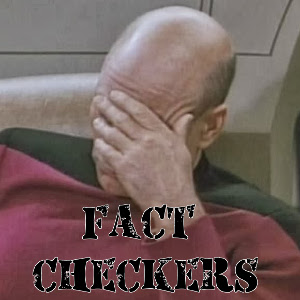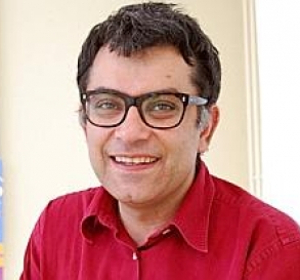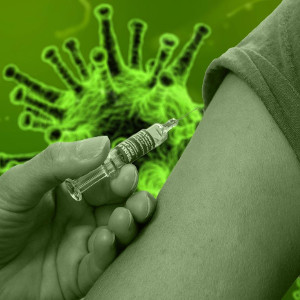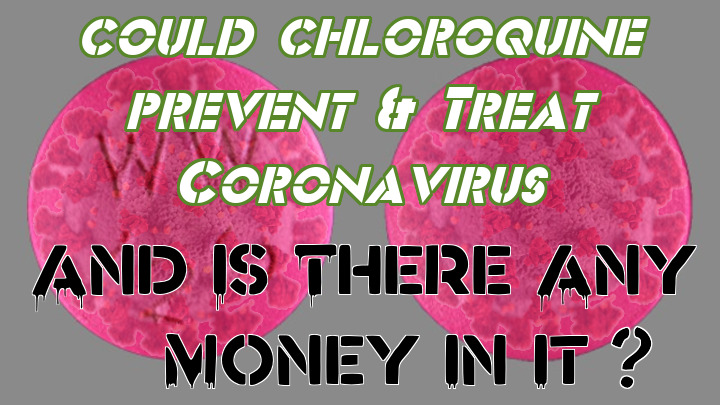[Disclaimer: I am not medically qualified. If you feel ill you should seek medical advice and should never take prescribed medication unless medically advised to do so.]
Coronavirus is obviously a concern for all of us. The UK government have stated their wish to ensure the public receive the best possible advice and guidance on how to protect themselves, their loved ones and the wider community. This is reassuring, because if they are true to their word, we may have reason to anticipate some good news in the next few days.

The Chinese claim they have successfully treated COVID 19 patients with chloroquine. Researchers at Qingdao University have recommended that chloroquine be incorporated in the guidelines for the prevention, diagnosis, and treatment of pneumonia caused by COVID-19 (SARS-CoV-2). Deputy head of the Chinese National Center for Biotechnology Development Sun Yanrong said they identified chloroquine as the best treatment option after several screening rounds of thousands of existing drugs.
Both chloriquine and another drug Remdesivir showed promising results in laboratory tests. However the Chinese clinical trial found chloroquine to be the most effective in preventing and treating coronavirus in infected patients. These results would seem to to indicates the urgent need for wider clinical trials across all infected populations.
In a consultation paper written on March 13th from the Stanford University School of Medicine, UAB School of Medicine and National Academy of Sciences in the U.S researchers stated:
“Recent guidelines from South Korea and China report that chloroquine is an effective antiviral therapeutic treatment against Coronavirus Disease 2019. Use of chloroquine (tablets) is showing favorable outcomes in humans infected with Coronavirus including faster time to recovery and shorter hospital stay. US CDC research shows that chloroquine also has strong potential as a prophylactic (preventative) measure against coronavirus in the lab….Chloroquine is an inexpensive, globally available drug that has been in widespread human use since 1945 against malaria, autoimmune and various other conditions…..The U.S. CDC and World Health Organization have not published treatment measures against Coronavirus disease 2019 (“COVID-19”).”
In both South Korea and China patients have been successfully treated using chloroquine. The U.S. researchers explained how chloroquine appears to be effective in treating COVID 19:
“COVID-19 in a single stranded, positive strain RNA virus with a protein shell and membrane…..There are significant similarities between COVID-19 and SARS coronavirus. ……Specifically, the virus depends on turning over the host proteins to trigger response for available building blocks to make their own proteins or nucleic acids….It is this part of the coronavirus’ replicative path that chloroquine inhibits……chloroquine has the unique ability to get into cells and cross endosomal membranes……Chloroquine’s entrance into the organelle likely constipates the whole [COVID 19 viral] system.”
The question is, while we wait for a COVID 19 vaccine and the economy collapses, why are western governments not surging ahead with clinical trials of chloroquine?

The Chloroquine Debate
There are a couple of caveats. The Chinese initial study findings were based on a relatively small, though not insignificant, study group of just over 100 patients. Furthermore, while their research has been available for weeks, oddly enough the Chinese data has yet to be formerly reviewed by the wider scientific community. Professor Astrid Vabret, Head of the Virology Department at the University Hospital of Caen has warned against undue optimism:
“The history of chloroquine as an antiviral is a soap opera that gives us a new episode with each emerging virus”

She points out that chloroquine often performs encouragingly in vitro (studied in petri dishes) but that promise frequently fails to materialise in clinical settings.
However, that criticism doesn’t apply in this case. The Chinese results were based upon clinical trials from the treatment of more than 100 patients in 10 hospitals in Wuhan, Jingzhou, Guangzhou, Beijing, Shanghai, Chongqing, and Ningbo. Additionally, in both China and South Korea, patients are being successfully treated with chloroquine. Publishing their initial results, complete with references to the China clinical trial data sets, in a letter to Bio Science Trends, the Chinese researchers reported:
“Thus far, results from more than 100 patients have demonstrated that chloroquine phosphate is superior to the control treatment in inhibiting the exacerbation of pneumonia, improving lung imaging findings, promoting a virus negative conversion, and shortening the disease course according to the news briefing. Severe adverse reactions to chloroquine phosphate were not noted in the aforementioned patients. Given these findings….regulatory authorities and organizers of clinical trials reached an agreement that chloroquine phosphate has potent activity against COVID-19. The drug is recommended for inclusion in the next version of the Guidelines for the Prevention, Diagnosis, and Treatment of Pneumonia Caused by COVID-19”

With the clinical data sets clearly cited, medical researchers around the world have had access the data since 20th February 2020. The impression given by alleged fact checkers that the Chinese trials “provided few details as to how the trials were carried out” is not accurate.
Some seem content to shrug their shoulders and casually suggest the Chinese clinical trials lacked rigour. However, one of the world’s leading experts in infectious diseases Prof. Didier Raoult not only holds the Chinese scientists in high regard but has also ordered the Mediterranean Infection Institute (IHU) he heads to stockpile chloroquine to treat infected patients. Following publication of the Institute’s article Coronavirus Endgame [English translation here] in an interview published on the 26th February 2020, with refreshing candour, Prof. Raoult said:
“There are billions of people who have taken this drug. And it costs nothing: ten cents per tablet. It is a drug that is extremely safe and the cheapest that you can imagine. So this is great news!….My job has been infectious diseases for forty years. I feel compelled, because I believe that it is now necessary, to communicate what I know, and not opinions, on research in infectious disease….we showed that a drug worked on a hundred people while everyone is having a nervous breakdown…..that there are noodles who say that we are not sure that it works, it does not interest me! Chinese scientists are very serious people. They are not zozos, and they have shown that chloroquine works. It would honestly be a medical mistake not to give chloroquine to the Chinese coronavirus. It does not make sense.”
Consequently Prof. Raoult led further clinical trials of chloroquine in combination with azithromycin. With the same results as the Chinese study. They found:
“Our survey shows that hydroxychloroquine treatment is significantly associated with viral load reduction/disappearance in COVID-19 patients and its effect is reinforced by azithromycin.”
Trials in Japan provide further reason to rapidly asses the repurposing potential of chloroquine for preventing and treating coronavirus. It is a widely used medication and known to be relatively safe. Certainly safer than the alleged threat of Covid 19.
Further statistical analysis by the NASA scientists Roy Spencer suggests chloroquine, widely used as an antimalarial in sub Saharan Africa and elsewhere, may indeed have prophylactic preventative properties. By comparing coronavirus infection rates in countries with high rates of malaria (high use of chloroquine in particular and other antimalarial medication) he found a direct correlations. The more malaria (chloroquine) the less COVID 19. He stated:
“In all my years of data analysis I have never seen such a stark and strong relationship: Countries with malaria basically have no COVID-19 cases (at least not yet).”
If the Chinese clinical trials demonstration of efficacy is proven, repurposing chloroquine for coronavirus would be easy, rapid and inexpensive. Perhaps we could reduce the number of families who “lose loved ones before their time?”
Given the claimed severity of the emergency, surely it makes sense to listen to world renowned experts in infectious diseases and fast track chloroquine research in the hope of quickly approving it for coronavirus prevention and treatment?

Profits vs Lives
For large pharmaceutical companies there is little to no profit to be made from a generic drugs like chloroquine. To date chloroquine is the only drug to have apparently proven effective against COVID 19 in clinical trials. While the mainstream media (MSM) has been all but silent on chloroquine some are starting to talk about it along with other hopeful treatments such as Remdisiver, Ritonavir and Lopinavir. All of which are patented. Remidisiver trials are set to complete in April.

From a health perspective the ownership of a drug patent makes absolutely no difference at all. It only effects the price. For some reason, despite being the most promising, abundant, cheapest and trialled of all potential treatments, there is inexplicable reluctance to begin clinical trials of chloroquine in Europe. Perhaps chloroquine can’t treat coronavirus. That’s the point of trials.
Professor Yazdan Yazdanpanah, head of France’s health emergency rapid response committee (REACTing – REsearch and ACTion targeting emerging infectious diseases) confirmed they are not going to bother trialling chloroquine and will only trial the patented drugs:
“We have not retained it [chloroquine] for the moment, in particular because of its undesirable effects. It also has frequent interactions with other drugs. However, intensive care patients are often treated with multiple drugs.”
Perhaps one of its undesirable effects is preventing and treating coronavirus? Who knows what he’s talking about? The decision is contrary to the prevailing science and, from a health care perspective, makes no sense whatsoever.
REACTing is a committee of Inserm which operates under the joint authority of the French Ministries of Health and Research. Through their Inserm Transfert public private partnership Insern hold 82 license agreements and 300 R&D agreements with pharmaceutical corporations. It is delighted to announce its patent successes.
It seems possible that the French response to the coronavirus pandemic is influenced by a desire to make money. Or maybe the REACTing committee broke under the pressure and have gone collectively insane?
Here in the UK we can only hope that the British response isn’t driven by commercial interests. The good news is that the UK government banned the parallel export of all potential treatments, including chloroquine, on the 26th February 2020, just 6 days after Chinese researchers published their results. Indicating the British government are fully aware of their work.
However, despite doing their best to maintain calm and give us the facts, the information given to the public by the the UK government makes no mention of these emerging possible treatment options. It’s as if they believe hope is bad for us. Or perhaps it’s because they’ve been sat on the Chinese results for the best part of a month and haven’t done anything? It’s hard to say.
In any event there is no evidence they have authorised repurposing trials for chloroquine in the UK. Only vague mentions of drug testing. Instead, the UK government’s Action Plan, published on 3rd of March 2020, appears to be overwhelmingly focused on a vaccine. One that hasn’t even been developed yet, let alone trialled:
“Given that there is currently neither a vaccine against COVID-19 nor any specific, proven, antiviral medication, most treatment will therefore be towards managing symptoms and providing support to patients with complications…..innovate responses including diagnostics, drugs and vaccines… to inform the development of the most effective models of care….The Delay phase also buys time for the testing of drugs and initial development of vaccines….The UK government has already pledged £20 million to the Coalition for Epidemic Preparedness Innovations (CEPI) to develop new vaccines……, including vaccines for COVID-19….The UK government has also additionally announced….COVID-19 research. This asks for proposals for projects to develop vaccines, therapeutics, and diagnostics; or to address the epidemiology, spread or underpinning knowledge of COVID-19….[ensure] you and your family’s vaccinations are up to date as this will help reduce the pressure on the NHS/HSCNI through reducing vaccine-preventable diseases”

UK government hopes are apparently all in the COVID 19 vaccine basket. With the support of tax payers, the Coalition for Epidemic Preparedness Innovations (CEPI) launched its call for research into a COVID 19 vaccine on February 3rd 2020.
CEPI was founded as a joint project between the World Economic Forum, The Norwegian and Indian governments, the Bill and Melida Gates foundation and GlaxoSmithKline’s foundation the Wellcome Trust. It’s partners include the European Commission and numerous pharmaceutical corporations.
CEPI recently received another €140 million from the German government to top up its tax subsidised funds to $760 million. They estimate they need to raise $2 billion for COVID 19 vaccine development and have been fishing for funds:
“We call on other sovereign states, private sector partners, and philanthropies around the world to invest in CEPI’s crucial push to develop a vaccine against the COVID-19 virus…CEPI has moved with great urgency and in coordination with WHO [World Health Organisation]…We have initiated several partnerships…The aim is to advance COVID-19 vaccine candidates into clinical testing as quickly as possible.”
CEPI has partnered with U.S. vaccine giant Novavax to develop the coronavirus vaccine. This $4 million investment, alongside its collaboration with the multinational Emergent Biosolutions, saw the Novavex share price surge while the stock market has been in free fall. Foreknowledge of this move certainly would have been profitable. CEPI hopes are high they will win the race to produce probably the most lucrative vaccine in history.
While all this high finance slushing around pharmaceutical corporations may well help to deliver a vaccine by the end of September (According to CEPI), unlike potential drug solutions like chloroquine and the combined HIV drug Kaletra, it will do nothing to stop the spread or assist the treatment of COVID 19 in the meantime. Currently there is no sign from the UK government of any intention to focus on these immediate clinical priorities. They could be right on it, beavering away behind the public facade. We have no way of knowing. Instead they have decided to ask all of us to self isolate and get used to social distancing.
Perhaps the best chance is a well informed medical profession and the Access to Medical Treatments (Innovation) Act. It states:
“The purpose of this Act is to promote access to innovative medical treatments (including treatments consisting in the off-label use of medicines or the use of unlicensed medicines).”
The purpose of the Act is to allow responsible doctors to prescribe off label (using licensed drugs for innovative purposes) or unlicensed drugs for treatment.
We live in hope.









The Medical Mafia is an vile entity. They probably know that choroquinine is a effective medication for other illnesses. The Medical Mafia is in the extortion business!
Thanks for the comment. I’m not sure what you mean by “medical mafia.” I think the vast majority of the medical profession are honest hardworking people who care about their patients. However, if you mean health policy makers, medical researchers and leading journals have far too many conflicts of commercial interest with pharmaceutical corporations and private healthcare providers I agree. Nor am I overly convinced that allopathic medicine is the only viable form.
August 2005: Chloroquine is a potent inhibitor of SARS coronavirus infection and spread
https://virologyj.biomedcentral.com/articles/10.1186/1743-422X-2-69